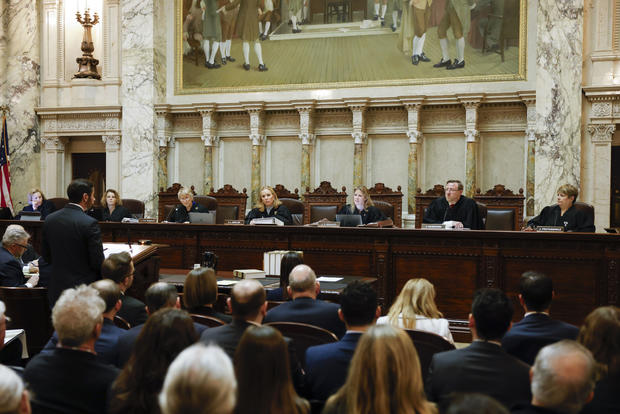The Wisconsin Supreme Court has thrown out the GOP-drawn district maps. That could mean a huge change for the purple state
In Wisconsin, statewide elections tend to be won with slim margins. In 2020, Joe Biden defeated Donald Trump by a mere 21,000 votes out of 3.2 million cast, which was about the same as Trump's 22,000-vote edge over Hillary Clinton four years earlier. But the nearly even divide across the state is not reflected in the Wisconsin Legislature, where Republicans dominate the Assembly with a 64-35 majority over Democrats, and a 22-11 majority in the state Senate.
However, the state's political landscape could shift substantially after the Wisconsin Supreme Court threw out the GOP-drawn legislative lines in late December. The court, in a 4-3 ruling, said the districts violated state constitution's requirement that districts be drawn contiguously and ordered new maps. Set to be enforced in March 2024, the revised district lines would put all 132 state lawmakers up for reelection in a pivotal year, providing Democrats with an opportunity to challenge the Republican stronghold on the legislature.
State Republicans told the Milwaukee Journal Sentinel that they plan to take the fight over the district maps to the U.S. Supreme Court.
"We will pursue all federal issues arising out of the redistricting litigation at the U.S. Supreme Court," Assembly Speaker Robin Vos said in a statement to the Milwaukee Journal Sentinel after the state Supreme Court's decision.
If a new map is put in place and results in a more evenly divided legislature, it could hold implications for key issues such as abortion, which was previously rejected by Republicans for inclusion on the 2024 ballot.
Nicole Safar, executive director at Law Forward, a nonprofit law firm representing the 19 Democratic voters in the lawsuit filed against the current map, said tossing the GOP-gerrymandered map will give voters more of a voice in the legislative process.
"I think in the next legislative session in 2025 and 2026, we will see a different kind of ability for the citizens to impact the policies that our legislature makes. We'll see real organizing, lobbying and campaigning around things like access to abortion, gun safety and public education," Safar said.
The lawsuit was filed in August, shortly after state Supreme Court Justice Janet Protasiewicz was sworn in, which tilted the Wisconsin Supreme Court from a conservative to a liberal majority. The race was the most expensive state Supreme Court election in American history, with Democrats spending over $50 million. In television advertisements, Protasiewicz called the maps "unfair" and "rigged" and spoke about her support of abortion rights.
Writing the dissent on the lawsuit, Chief Justice Annette Ziegler, a conservative, drew on Protasiewicz's past statements. Ziegler argued that liberals were only hearing the gerrymandering case due to their current majority.
There "appears to be evidence of a partisan and political, rather than a reasoned and restrained, approach, and thus departs from the constitutional role of the judiciary," Ziegler wrote.
Republicans contended that the redesigned map would lead to the creation of more Democrat-friendly districts before the 2024 election and had called for Protasiewicz to recuse herself from the case.
Speaker Vos even threatened impeachment if Protasiewicz refused. However, the Republican leader later stated during a news conference in October that they would temporarily drop impeachment charges and appeal any decisions to the U.S. Supreme Court if the state Supreme Court ruled on Republican-drawn maps and other conservative causes.
The state Supreme Court noted that the GOP-majority legislature is responsible for redrawing the maps, but acknowledging that it might decline to do so or that it might pass maps that Democratic Gov. Tony Evers might veto, the court said it would enact remedial maps for the 2024 elections, unless new maps can be enacted through legislation.
Evers, who has largely relied on his veto to try to block the Republicans' agenda during his tenure, said in a statement: "It's clear to me that a Republican-controlled Legislature that has consistently gerrymandered itself into comfortable, partisan majorities for more than a decade is incapable of preparing fair, nonpartisan maps deserving of the people of this state. I agree with the Court's determination that these maps are unconstitutional because the districts lack contiguity. Wisconsin is a purple state, and I look forward to submitting maps to the Court to consider and review that reflect and represent the makeup of our state. And I remain as optimistic as ever that, at long last, the gerrymandered maps Wisconsinites have endured for years might soon be history."
Mark Gaber, a senior director at the Campaign Legal Center, a nonpartisan group that seeks to curb partisanship in redistricting, suggested that a new map would likely not heavily favor either Republicans or Democrats.
"Wisconsin is a politically divided state with very close elections, with down-ballot races being even closer," Gaber said.
And while Democrats are celebrating the redrawing of the state's district lines, Gaber said the ruling should be viewed as a win for both parties because the new map will be "more representative of the true electorate."




